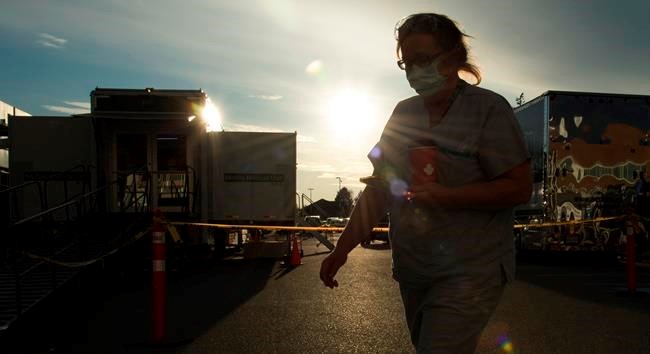OTTAWA — While there's reason to believe the spread of COVID-19 is slowing, Canadian leaders warned Wednesday it was too soon to ease distancing measures, even as the country's central bank warned the downturn tied to the virus could be the worst on record.
On the day Canada passed the grim milestone of 1,000 deaths, chief public health officer Dr. Theresa Tam nonetheless said there is cause to be "cautiously optimistic" that the rate of growth is slowing.
Tam noted the number of cases in the country is now doubling every 10 days or so, compared to every three days in late March.
But she said Canada still hasn't reached the peak of the outbreak, and it's too soon to back off physical distancing measures.
"Coming down from this epidemic curve will be like making our way down from a mountain in the darkness," Tam said during her daily briefing in Ottawa.
"We mustn't rush or let go of our safety measures, or the fall will be hard and unforgiving."
Prime Minister Justin Trudeau warned it would still be several more weeks before the country will be able to consider loosening restrictions that have caused businesses to shutter and put the economy in a tailspin.
Widespread testing and the ability to rapidly track down the contacts of infected people will be key to an eventual return to normal activities, he said.
"We have to be through this first wave sufficiently to be able to know we have the capacity to stamp out and restrict any future outbreaks as they come along," Trudeau said.
"That means technology, that means better testing capacity, that means continued vigilance — not just by governments but by all Canadians.... We're still a number of weeks away from that."
Trudeau announced New Brunswick company LuminUltra was increasing production of chemicals needed to provide the required weekly supply for COVID-19 tests in all provinces. The country has also received more shipments of the swabs needed for the tests, he said.
Millions have lost their jobs as the pandemic has forced the closure of businesses, and consumer spending has plummeted as people have been urged to stay home to stop the spread of the virus.
Economic activity dropped a record nine per cent in March alone, preliminary data released by Statistics Canada suggested.
The estimate, which is to be refined over time, would be the sharpest decline in the nearly 60 years the agency has kept such data.
Despite the bleak economic news, Trudeau was blunt as he warned that easing restrictions too soon could unleash a second wave of infections just as damaging as the first.
"If we reopen too soon, everything we're doing might be for nothing," the prime minister said.
Provinces including Manitoba, P.E.I., New Brunswick, and Newfoundland and Labrador each reported three or fewer new cases on Wednesday, but devastating outbreaks continued to sweep through long-term care centres in other jurisdictions, killing vulnerable seniors by the dozens.
The death toll across the country surpassed the 1,000 mark with the announcement of 51 more fatalities in Ontario and 52 in Quebec.
As of Wednesday afternoon, the country counted more than 28,200 confirmed COVID-19 cases, with over half of them in Quebec.
Premier Francois Legault made a desperate plea for family doctors and medical specialists to help out in long-term care homes, where major outbreaks have exacerbated long-running staffing issues.
Quebec has released a five-page list of seniors residences and care homes with at least one COVID-19 case, including 25 institutions where at least a quarter of residents are infected.
Those include a long-term care home in Laval, north of Montreal, which counted 26 dead and 120 infected.
Ontario, meanwhile, had 98 facilities reporting COVID-19 outbreaks that have together killed at least 145 residents, including 29 who died at Pinecrest Nursing Home in Bobcaygeon, and 27 at Eatonville Care Centre in Toronto.
On the economic front, the Bank of Canada on Wednesday kept its key interest rate target on hold at 0.25 per cent, saying that it is effectively as low as it can go.
It warned the downturn tied to COVID-19 will be the worst on record and the economic recovery will depend on the effectiveness of current measures to bring the pandemic under control.
By Sunday night, some six million people had applied for a $2,000-a-month emergency benefit.
To give a boost to struggling workers, Trudeau expanded the criteria of the Canada Emergency Response Benefit on Wednesday to include seasonal workers, those who are still working but earning less than $1,000 a month and those whose employment insurance has run out.
He said he would also be working with the provinces to raise the salaries of essential workers who earn less than $2,500 a month, which includes many working in care homes.
This report by The Canadian Press was first published April 15, 2020.
— By Morgan Lowrie in Montreal
The Canadian Press




